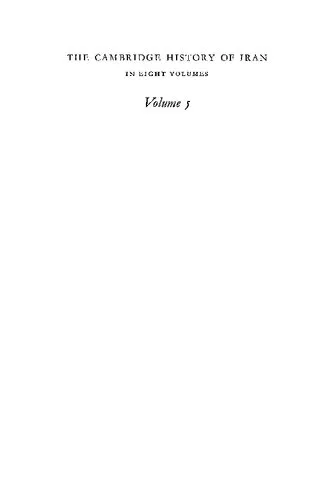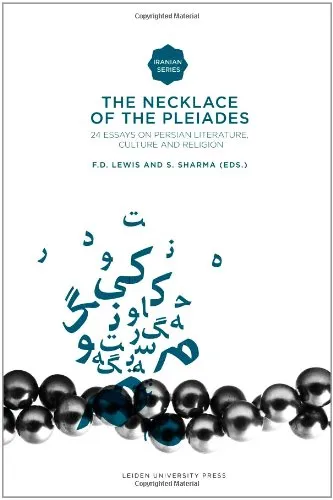The Cambridge History of Iran Vol. 5: The Saljuq and Mongol Periods
4.4
بر اساس نظر کاربران

شما میتونید سوالاتتون در باره کتاب رو از هوش مصنوعیش بعد از ورود بپرسید
هر دانلود یا پرسش از هوش مصنوعی 2 امتیاز لازم دارد، برای بدست آوردن امتیاز رایگان، به صفحه ی راهنمای امتیازات سر بزنید و یک سری کار ارزشمند انجام بدینکتاب های مرتبط:
خلاصه تحلیلی کتاب
این جلد از مجموعه ارزشمند The Cambridge History of Iran، که با عنوان «The Saljuq and Mongol Periods» شناخته میشود، به بررسی یکی از پیچیدهترین و پرتحولترین دورههای تاریخ ایران میپردازد. این اثر زیر نظر علمی و ویراستاری J. A. Boyle تدوین شده و با نگاهی ترکیبی از تاریخ سیاسی، اجتماعی، اقتصادی و فرهنگی، تحولات ایران از طلوع قدرت سلجوقیان تا شکلگیری و فروپاشی سلطه مغول را تحلیل میکند.
کتاب به جای رویکرد صرفاً روایی، با استفاده از منابع معتبر و گاه کمیاب، به تحلیل چرایی و چگونگی رخدادها میپردازد، از اصلاحات اداری گرفته تا تغییرات ساختار قدرت، و از شاخصههای تمدنی گرفته تا تأثیرات متقابل ایران و جهان اسلام. همین رویکرد تحلیلی باعث شده این جلد برای پژوهشگران تاریخ، ایرانشناسان، و دانشجویان علوم انسانی یک مرجع بیبدیل باشد.
در این اثر، فصلهای مختلف به گونهای سازماندهی شدهاند که خواننده بتواند مسیر تحولات دو سلسله بزرگ - سلجوقیان و مغولان - را به وضوح دنبال کند، ضمن آنکه به ابعاد مختلفی چون معماری، هنر، فلسفه و روابط فراملی نیز توجه شده است.
نکات کلیدی و کاربردی
یکی از برجستهترین نقاط قوت کتاب، اتکا به رویکرد میانرشتهای است؛ ترکیب دانش تاریخ با مردمشناسی، اقتصاد و مطالعات نظامی، درک کاملتری از دورههای سلجوقی و مغولی ارائه میکند. خواننده نه تنها با وقایع، بلکه با زیرساختها و موانع توسعهای آن زمان آشنا میشود.
نکته مهم دیگر، بهرهگیری از منابع موجود در زبانهای مختلف، از فارسی و عربی گرفته تا منابع لاتین و چینی است که غنای ویژهای به تحلیلها بخشیده است.
همچنین، اثر به نقش ایران بهعنوان پل فرهنگی و تجاری میان شرق و غرب در این دو دوره تاریخی پرداخته و نشان داده چگونه تحولات سیاسی بر مسیر تجارت، علوم و هنر اثر گذاشته است.
این کتاب میتواند ابزار ارزشمندی برای محققان تاریخ سلجوقیان و تاریخ امپراتوری مغول باشد تا با چشماندازی جامعتر به پژوهش و تدریس بپردازند.
نقلقولهای ماندگار
کتاب در برخی بخشها، دیدگاههای نویسندگان و پژوهشگران برجسته را در قالب نقلقولهایی ارزشمند ارائه میدهد که خواننده را به تأمل بیشتر درباره روند تاریخ ایران در دورههای یادشده وا میدارد.
«هر تغییر در ساختار قدرت، بازتابی مستقیم در حیات فرهنگی ایران داشته است؛ از معماری تا ادبیات، همه متأثر از سیاست حاکمان بودهاند.» نامشخص
«ایران در دوران سلجوقی و مغولی نه یک سرزمین منفعل، بلکه یک بازیگر فعال در شبکه پیچیده جهان اسلام و اوراسیا بود.» نامشخص
چرا این کتاب اهمیت دارد
کمتر کتابی توانسته همچون این جلد از The Cambridge History of Iran، تصویری جامع و مبتنی بر نقد منابع را از دو دوره حیاتی تاریخ ایران عرضه کند. اهمیت این اثر تنها در بازخوانی گذشته نیست، بلکه به ما میآموزد چگونه وقایع پیشین بر مسیر امروز و فردای ایران اثرگذار بودهاند.
از نظر روششناسی، کتاب الگویی برای تدوین آثار علمی بزرگ و چندپژوهشی است. برای پژوهشگران حرفهای، مطالعه آن الهامبخش و راهگشاست. برای کتابخوانهای جدی، تجربهای است غنی که هم آگاهی تاریخی را ارتقا میدهد و هم علاقه به تاریخ ایران را عمق میبخشد.
نتیجهگیری الهامبخش
مطالعه «The Cambridge History of Iran Vol. 5: The Saljuq and Mongol Periods» نه تنها دریچهای به گذشته باشکوه و پرچالش ایران
Analytical Summary
The Cambridge History of Iran Vol. 5: The Saljuq and Mongol Periods stands as a leading scholarly reference chronicling the complex transformations that marked medieval Iran between the 11th and 14th centuries. Edited by J. A. Boyle, this extensive work offers a multidisciplinary synthesis of political, cultural, religious, and economic developments during the reigns of both the Saljuq dynasty and the Mongol rulers.
The volume’s analytical depth is rooted in contributions from eminent historians and academics who draw on primary sources, archaeological evidence, and contemporary scholarship. It navigates through the nuanced rise of the Saljuqs, their military prowess, administrative reforms, and the flourishing of Persian culture under their patronage. It also documents the seismic shift brought about by the Mongol invasions, examining the Ilkhanid state’s policies, urban reconstruction, and the subtle interplay between nomadic traditions and sedentary governance.
A particular emphasis is placed on Iran’s position as a nexus between East and West, highlighting its strategic significance in transcontinental trade, intellectual exchange, and the dissemination of artistic innovation. While precise publication year details are unavailable due to no reliable public source, the scholarly integrity of the volume remains universally acknowledged.
Key Takeaways
This book delivers enduring insights that benefit historians, regional specialists, and readers with a passion for Middle Eastern studies, offering lessons that remain relevant to contemporary geopolitical discourse.
Readers come away with a clearer understanding of how the Saljuq empire unified disparate territories under a coherent administrative framework, fostering a climate where literature, science, and theology could flourish. The Mongol era’s contributions, often overshadowed by its initial violence, are revealed through nuanced discussions of statecraft, religious tolerance in certain periods, and infrastructural expansion.
The Cambridge History of Iran Vol. 5: The Saljuq and Mongol Periods also engages with themes of resilience, illustrating how Iranian society adapted to successive waves of change without losing its cultural identity. Secondary keywords such as “Saljuq empire history” and “Mongol Iran studies” resonate throughout the narrative, ensuring the book’s relevance for targeted academic research.
Memorable Quotes
“The Saljuq ascendancy marked not merely a change in rulers, but a redefinition of Iran’s role in the Islamic world.” Unknown
“Under Mongol dominion, despite early devastation, Iran witnessed an era of unprecedented cultural synthesis.” Unknown
“The interplay between Persian traditions and Turco-Mongol governance set the stage for transformations extending far beyond Iran’s borders.” Unknown
Why This Book Matters
The Cambridge History of Iran Vol. 5: The Saljuq and Mongol Periods is not just a historical record—it is a gateway to understanding how medieval Iran shaped and was shaped by global forces.
For scholars, it offers a rigorous, evidence-based narrative that challenges simplistic interpretations. For professionals in related fields such as cultural heritage, international relations, and comparative political systems, it provides transferable insights into governance models and societal change. Even for the engaged lay reader, it opens doors to appreciating the interwoven tapestry of Persian resilience, diversity, and innovation.
By situating Iran at the heart of Eurasian history, this volume proves indispensable for building nuanced perspectives, thereby underscoring its enduring academic and cultural relevance.
Inspiring Conclusion
In engaging with The Cambridge History of Iran Vol. 5: The Saljuq and Mongol Periods, readers are invited to embark on an intellectual journey that transcends mere chronology.
This authoritative volume stands as a testament to how Iran’s medieval epochs forged enduring legacies that continue to influence the modern world. Its rigorous scholarship, rich detail, and balanced interpretations ensure that it remains an invaluable resource for anyone seeking to deepen their understanding of Saljuq empire history and Mongol Iran studies.
Whether you choose to read, share, or discuss the insights within, the knowledge embedded in its pages offers both a foundation and an inspiration for further exploration. Let it serve as your point of departure into the vast and interconnected narratives of Eurasian history.
دانلود رایگان مستقیم
شما میتونید سوالاتتون در باره کتاب رو از هوش مصنوعیش بعد از ورود بپرسید
دسترسی به کتابها از طریق پلتفرمهای قانونی و کتابخانههای عمومی نه تنها از حقوق نویسندگان و ناشران حمایت میکند، بلکه به پایداری فرهنگ کتابخوانی نیز کمک میرساند. پیش از دانلود، لحظهای به بررسی این گزینهها فکر کنید.
این کتاب رو در پلتفرم های دیگه ببینید
WorldCat به شما کمک میکنه تا کتاب ها رو در کتابخانه های سراسر دنیا پیدا کنید
امتیازها، نظرات تخصصی و صحبت ها درباره کتاب را در Goodreads ببینید
کتابهای کمیاب یا دست دوم را در AbeBooks پیدا کنید و بخرید
1172
بازدید4.4
امتیاز50
نظر98%
رضایتنظرات:
4.4
بر اساس 0 نظر کاربران
"کیفیت چاپ عالی بود، خیلی راضیام"
Questions & Answers
Ask questions about this book or help others by answering
No questions yet. Be the first to ask!



